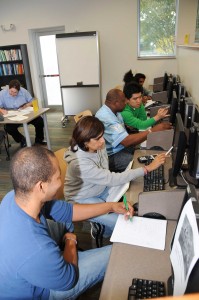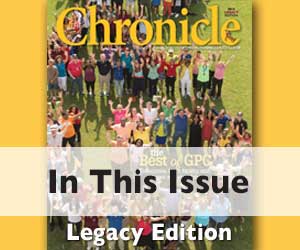
Martha Nega, standing, instructs GPC student Chelsey Johnson in the My Foundations Lab pilot program. (Photo by Bill Roa)
New Programs Aim to Raise Retention, Graduation Rates
by Beverly James
The future health of Georgia’s economy demands that an increasing number of students not only go to college, but that they complete a degree program once they arrive.
State and local education leaders recently adopted an umbrella program focused on accomplishing just that.
Complete College Georgia, a statewide initiative that is part of a national program, strives to boost the number of college graduates in our state, raise job market credentials of Georgians and close the college attainment gap of underrepresented groups.
Studies show that by 2020, more than 60 percent of jobs in Georgia will require a certificate, associate degree or bachelor’s degree. Currently only 42 percent of the state’s young adults who make up the emerging work force meet that criteria. To address this need, the University System of Georgia and the Technical College System of Georgia, which together represent 60 institutions of higher learning, have teamed up.
Throughout Georgia’s university system, a move to keep students on track and increase graduation rates is strengthening admission requirements and changing remedial education. At GPC, additional recommendations are emerging to prepare and support students.
At Georgia Perimeter College, the effort has produced additional recommended changes, among them:
• a pilot program to prepare students for placement testing
• reverse transfer agreements with partnering schools
• a streamlining of the degree-earning experience and
• enhanced outreach to high schools, military students, working students and others.
Admission requirements and Learning Support
In the spring, the USG Board of Regents changed admission requirements for the system’s institutions, requiring that college applicants now meet established minimum scores on the Compass college placement test before they can gain admission to a USG school.
The Compass exam helps educators evaluate students’ competency in reading, English and math, place them in appropriate-level classes and connect them to resources.
Starting this fall, for the first time, applicants to Georgia Perimeter were required to either place into college-level coursework with SAT/ACT scores or achieve minimum scores of 20 on the Compass math test, 32 on English and 62 on reading in order to be admitted to the college. Applicants who met those minimum scores but still needed remedial help (also known as Learning Support) in all three subjects were not eligible to be admitted to GPC.
Learning Support is a program of classes and advisement used to prepare students for college-level work in English, reading or math. Historically, Learning Support classes were offered at a lower level and a higher level. GPC will continue to offer Learning Support, but only at the higher level, for students who meet the minimum admission scores but still need help in just one or two areas.
The changes make sense because the retention rate of students who place in lower-level Learning Support classes—which GPC no longer offers as of fall 2012—or in all three areas of the remedial classes has historically been very low, approximately 10 percent, according to Richard Beaubien, GPC’s director of Recruitment and Admissions.
“If we are consistently losing these students who need Learning Support, then we are not serving their dreams of earning a college education,” Beaubien says. “We had to find a different way to help them achieve success.”
That “different way” provides two new options.
Applicants for fall semester who did not meet the higher admission requirements were given the option to participate in a new pilot program that prepares them for the Compass exams. After completing the program, called My Foundations Lab, the students were eligible to be retested to see if their scores had improved enough for admission.
Applicants who don’t meet admission requirements also can enroll in one of Georgia’s technical colleges and reapply once they can fulfill GPC’s admission requirements. Georgia Perimeter is working to establish reverse transfer agreements with partnering schools, such as Georgia Piedmont Technical College, that will streamline that process.
“We thought these students would be better served by the technical college system,” Beaubien says. “They can go to Georgia Piedmont, complete their Learning Support requirements and come back to GPC ready to go.”
This summer, students who failed all or portions of the Compass exam or who met the cutoff scores but still tested into Learning Support used My Foundations Lab for two weeks and were retested during the third week, says math professor Sandee House. House helped develop and now administers the My Foundations Lab program. “We hope in the future to offer it to students before they take the Compass,” she says.
The university system is supporting GPC’s trial of the program, and the college’s Office of Institutional Research and Planning will measure its success. If successful, the USG hopes to replicate it at other institutions.
Students such as Aisha Onibudo say the program works.
“I didn’t meet the cutoff score for math, so it was suggested that I use My Foundations Lab,” says Onibudo, a business management major at Dunwoody Campus. “I’ve been out of high school for two years, and My Foundations Lab re-taught me a lot of things that I had completely forgotten. I definitely felt more confident going in to take the test the second time.”
Onibudo passed the Compass test on her second try and was accepted to GPC, where she continues to improve her math skills through a Learning Support class.
Early outreach and other initiatives

Students get extra help in GPC’s learning and tutoring centers. (Photo by Bill Roa)
Georgia Perimeter College is reaching out with other new programs and initiatives under Complete College Georgia as well, says Dr. Vincent June, vice president of Student Affairs and Enrollment Services.
The college plans to offer Compass testing to high school sophomores and then retest them during their senior year.
“Statewide, nearly one out of four high school graduates entering a USG institute in 2009 required Learning Support,” June says. “So, we plan to complement the Compass exam with pre-college institutes that offer tutoring and extra help to these students. Plus, the initial testing will give students two years to focus on academic areas identified as needing improvement.”
Early testing and extra help also will be offered to target groups, including students who are in the military or are veterans, as well as those who attend school part-time, those who have jobs, those from low-income situations and those with disabilities. “We want to increase their success in remedial education so they can go right into college-level courses,” says June.
The initiative’s goal, he added, is to reduce the portion of first-time, full-time students needing Learning Support from approximately 56 percent to 30 percent.
Smoothing the way for degree completion
In another Complete College effort, Georgia Perimeter is working to streamline college degree completion for students who have learned in other environments.
Of all institutions in the University System of Georgia, GPC serves the largest number of military students using VA benefits. A Prior Learning Assessment program for current military members and veterans may allow them to transfer credits earned in the military to GPC. “This will reduce the time it will take our military students to earn a degree,” June says.
Administrators also plan to increase by 10 percent the number of GPC students who participate in the federal Work Study program and to strengthen students’ knowledge of financial aid and responsibility. This will help students better address financial difficulties so they can remain in college and graduate in a timely manner.
GPC also will boost support for students in required introductory classes, such as English 1101 and 1102 and Math 1111, in an effort to increase the pass rate by 5 percent.
There also will be more support for students in “gateway” classes, such as Chemistry 1112, a prerequisite class for students planning a career in nursing, dental hygiene or other allied health fields. There are gateway classes to higher level courses in almost every major.
One way to ensure student success in gateway classes, June notes, is by enrolling more students in learning communities. A learning community is a small group of students who take several classes together and receive intensive faculty mentoring, advising and counseling.
“National and GPC data verify that participation in learning communities increases student retention,” June says. Several departments, such as Student Affairs, Enrollment Services, GPC Libraries and Academic Affairs will work together to support learning communities.
In the end, the college’s goal is to help each and every student earn a college degree.
“Everything we are doing in the Complete College Georgia plan is to make sure that we are giving every Georgian the opportunity to achieve his or her dream,” June says. “When it comes down to it, student success is the foundation for all we do at Georgia Perimeter.”







No Comments on “Commitment to Completion”